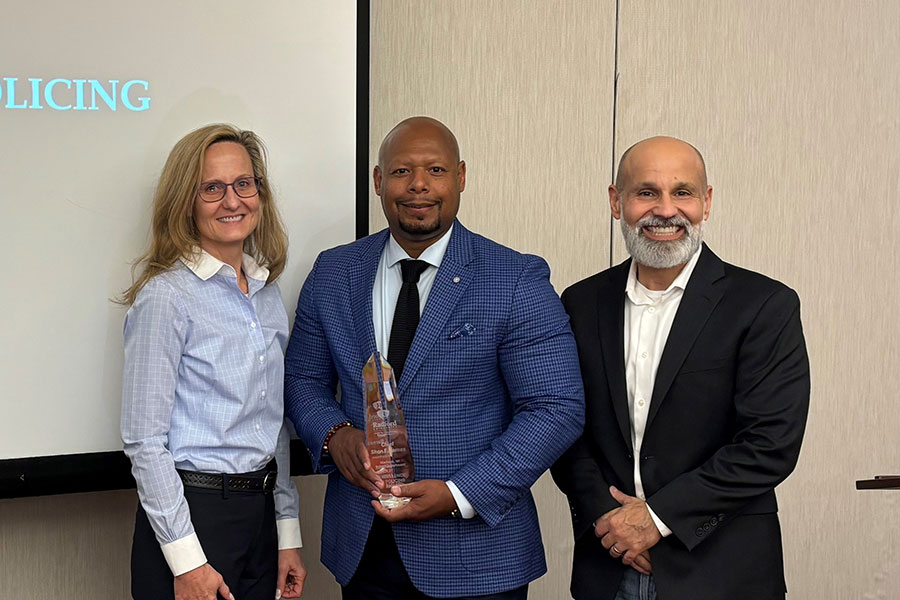Radford University’s Center for Police Practice, Policy and Research has presented its 2024 Excellence in Policing Award to City of Madison, Wisconsin,
Police Chief Shon F. Barnes, Ph.D.
Roberto and Rachel Santos, co-directors of the center and faculty members in Radford
University’s Department of Criminal Justice, present the award each year to a current
police executive. Recipients are noted leaders in their agencies and the law enforcement
profession as well as champions of innovative strategies that bring about change and
improve policing.
“It is with profound gratitude that I accept the 2024 Excellence in Policing Award
from Radford University's Center for Police Practice, Policy and Research,” Barnes
said. “This accolade holds a distinguished place in the annals of the Madison Police
Department – a department that has wholeheartedly adopted Stratified Policing principles.”
Since his arrival in early 2021, Barnes has emphasized community engagement and partnerships
and has introduced Stratified Policing as the department’s structure for sustainability
of proactive crime reduction efforts, which includes continual monitoring and continuous
reengagement of the problem-solving process (SARA).
Madison has seen significant decreases in crime since Barnes’ arrival that outpace
other similar cities, Rachel Santos noted. Since 2021, robbery is down 18%; burglary
is down 21%; theft from auto is down 49%; and auto theft is down 28%. The combined
decrease resulted in the equivalent of 1,047 fewer cases and associated victims.
“Our unwavering dedication to evidence-based policing strategies has led to unprecedented
reductions in crime rates and a significant enhancement in the rapport between the
police department and the Madison community,” Barnes said. “My heartfelt thanks go
to Dr. Roberto Santos and Dr. Rachel Santos for their invaluable research and mentorship
provided to the Madison Police Department. We remain steadfast in our pledge to set
the standard as a National Exemplar of Outstanding Policing.”
The Santoses note that it is an honor to present this award to Barnes.
“It’s rare to see the level at which Chief Barnes’ is able to integrate knowledge
and leadership,” Roberto Santos said, “with a sincere dedication to serving the community,
to improve the policing profession.”
The Santoses began presenting the award when the center opened in 2019. The first
recipient was Col. Nathaniel McQueen, Delaware State Police (retired), and current
State of Delaware Department of Safety and Homeland Security Cabinet secretary. Subsequent
winners have been Chief Scott C. Booth of the Roanoke (Virginia) Police Department,
Sheriff Michael Adkinson Jr. of Walton County, Florida, and Chief Maris Herold, Boulder
(Colorado) Police Department (retired), currently senior advisor, Bureau of Justice
Assistance.
The Center of Police Practice, Policy and Research combines evidence-based and practice-based
research to create knowledge from original research and translate research to practice
through publications, presentations, training and technical assistance.
The center is a place for networking and collaboration among Radford University faculty,
other police researchers and experts, police officers and administrators. The Santoses
partner with local and county police departments, state police and sheriff’s offices
around the United States to implement Stratified Policing in each agency’s daily operations
and institutionalize proactive crime reduction and community engagement. They also
partner with agencies to carry out large grant-funded projects that seek to translate
research on “what works,” they said, to police policy and practice.
In addition, the center is a means for mentoring undergraduate and graduate students
for careers in policing, crime analysis and research. Radford University criminal
justice majors are involved in research opportunities within the center related to
police/community engagement, cybercrime, crime prevention through environmental design,
critical incident management, crime and intelligence analysis and evidence-based crime
reduction strategies.
